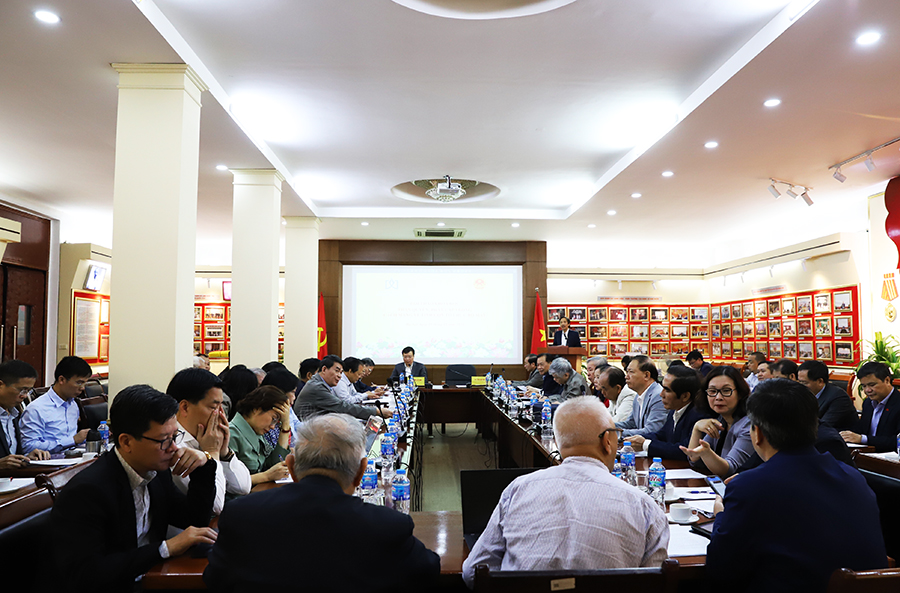On the morning of December 5, 2024, in Hanoi, the Ministry of Home Affairs, in collaboration with the Vietnam Association of Administrative Sciences, organized the workshop titled “Decentralization and Transfer of power in the Revolution of Streamlining Organizational Structures.” Vice Minister of Home Affairs Truong Hai Long and Dr. Tran Anh Tuan, Chairman of the Vietnam Association of Administrative Sciences and former Vice Minister of Home Affairs, co-chaired the workshop.
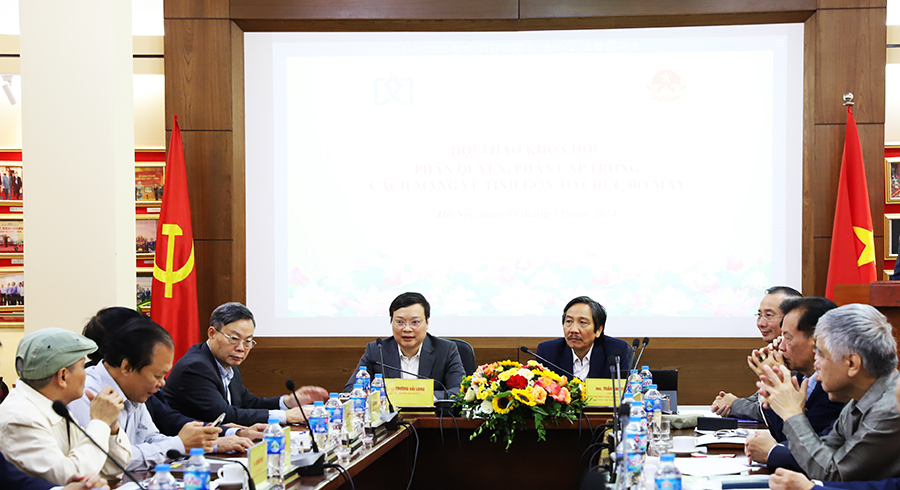
Vice Minister Truong Hai Long and Dr. Tran Anh Tuan presided over the workshop.
The workshop was attended by leaders and former leaders from several central and local ministries and departments, as well as scientists, experts, and leaders of various units under the Ministry of Home Affairs.
In his opening remarks, Vice Minister Truong Hai Long stated that decentralization and transfer of power in state management are critical to delineating authority across levels, thereby enhancing the efficiency and effectiveness of state administrative activities. This is especially significant in the context of building and perfecting the socialist rule-of-law state in Vietnam.
The documents from the 13th National Party Congress emphasize: “Promoting transfer of power and decentralization by clearly defining responsibilities between the Government and ministries; between the Government, ministries, and local governments; thoroughly addressing overlapping functions, tasks, and authorities; ensuring unified state management; while encouraging the initiative, creativity, and responsibility of each level and sector.”
The Vice Minister noted that over the past seven years of implementing Resolution No. 18-NQ/TW on reforming and reorganizing the political system’s organizational structure to make it streamlined, effective, and efficient, significant results have been achieved thanks to considerable effort and determination. These efforts have brought about initial positive changes in reorganizing the apparatus and improving the operational efficiency of agencies, units, and organizations within the political system.
However, the process of restructuring the organizational apparatus still reveals inconsistencies, a lack of comprehensiveness, and insufficient connection with staff streamlining and improving the quality of civil servants and public employees. The organizational structure of the political system remains cumbersome, with many layers and overlapping functions. Relationships, duties, and responsibilities among various agencies and organizations are often unclear, overlapping, or redundant. In some cases, responsibilities are avoided, while in others, tasks are neglected.
Notably, the decentralization and transfer of power between the central government, the Government, and local governments have not yet been substantive, consistent, or reasonable, failing to meet the demands of the new era. This has slowed the country’s development process, leading to a “request-grant” mechanism prone to corruption, waste, and negativity.
Vice Minister Truong Hai Long emphasized that given the urgent need for the revolution to streamline organizational structures, promoting decentralization and transfer of power between the Government and local governments is a pivotal factor. It serves as a driving force for development and a prerequisite for establishing an apparatus that is “streamlined, strong, efficient, effective, and impactful,” as directed by General Secretary Tô Lâm. This ensures efficient national governance, unified management by the Government, and the effective role and responsibility of local governments.
Decentralization and transfer of power are critical to streamlining the apparatus, representing a breakthrough initiative. When done well, it can eliminate overlaps and redundancies in management, reduce intermediary layers, enhance accountability, and create favorable conditions for citizens and businesses. To achieve this, a fundamental shift in mindset is required, enabling local governments to be proactive, creative, and capable of self-governance and accountability. Furthermore, decentralization and transfer of power must be closely linked to the competency of personnel, adequate resource preparation, accountability, and mechanisms for power control.
According to Vice Minister Truong Hai Long, the workshop is a valuable scientific forum where leaders, former leaders, experts, scientists, and managers can exchange theoretical and practical perspectives on decentralization and transfer of power. Topics include local government organizational models for advancing decentralization and transfer of power, meeting the requirements of national governance, controlling state power, and addressing current challenges and barriers to decentralization and transfer of power. The discussions aim to summarize findings, propose recommendations, and offer solutions to enhance the effectiveness of these mechanisms, laying the groundwork for innovation and national development strategies.
The Vice Minister expressed confidence that the workshop would yield practical outcomes, provide sharp arguments and evidence, and significantly contribute to the successful advancement of decentralization and transfer of power. This effort supports the revolutionary streamlining of organizational structures, creating a foundation for innovation and propelling the nation into a new era, the era of Vietnam’s ascent.
Dr. Tran Anh Tuan, Chairman of the Vietnam Association of Administrative Sciences, delivers the keynote at the workshop.
In his keynote speech, Dr. Tran Anh Tuan, Chairman of the Vietnam Association of Administrative Sciences and former Vice Minister of Home Affairs, stated that decentralization and transfer of power within the state apparatus from the central to the local level are of paramount importance. They enhance localities’ autonomy, decision-making, self-reliance, and accountability while ensuring national management uniformity by the central government. Proper decentralization and transfer of power drive development, fulfilling the goal of a political system that is “streamlined, strong, efficient, effective, and impactful.” Conversely, mismanagement of these processes will hinder the development of individual localities and the nation as a whole.
According to Dr. Tran Anh Tuan, in Vietnam, during this revolution to streamline organizational structures, decentralization and transfer of power between the central government and local governments are both urgent and pivotal. They represent a strategic breakthrough to remove bottlenecks, enabling each locality and the nation as a whole to enter an era of prosperity and development. Therefore, a proper approach to thinking, awareness, and practical application regarding decentralization and transfer of power is necessary.
In Vietnam, the 2013 Constitution stipulates the principles of allocation, transfer of power, and decentralization of authority. The tasks and powers of local governments are defined based on the delineation of authority between central and local state agencies and among different levels of local government.
Currently, the mindset and awareness regarding decentralization and transfer of power between the central and local governments have been slow to evolve to meet the demands of a market economy, rule-of-law state, national governance, and the information technology and digital transformation revolution.
“It can be said that decentralization has not changed significantly; the focus has been on transfer of power and authorization. Even transfer of power and authorization are mostly superficial, as they still require consultation, consensus, and agreement before making decisions. Everyone has authority, but no one takes responsibility,” Dr. Tran Anh Tuan remarked.
Dr. Tran Anh Tuan also noted that to navigate bottlenecks and obstacles in transfer of power and decentralization, many localities have sought ways to request pilot mechanisms and exceptional policies that exceed legal provisions. However, having too many exceptions nullifies their uniqueness and creates unfairness among localities.
In this revolution to streamline organizational structures, alongside restructuring the streamlined organizational framework of the Government and local governments, effectiveness and efficiency can only be achieved by enhancing decentralization and transfer of power between the central and local governments.
Dr. Tran Anh Tuan proposed several discussion points for the workshop:
- Fundamental issues of decentralization, transfer of power, and authorization: Definitions, principles, and the necessity of promoting these aspects in the current context.
- The relationship between the Government and local governments in decentralization and transfer of power: What roles do the Government and local governments play? How does the Government ensure unified national management and governance? How do local governments address their “issues” through decentralization and transfer of power?
- Identifying an organizational model for local governments: Aligning with urban and rural characteristics to enable “self-governance” with the principle of “localities decide, act, and take responsibility.”
- Authority in collective leadership and the role of individual responsibility: Especially for heads of administrative agencies, from the Government to People’s Committees at all levels.
- Power control in local governments when promoting decentralization and transfer of power: The Government’s role and responsibility in maintaining the unified nature of state administration when enhancing decentralization and transfer of power.
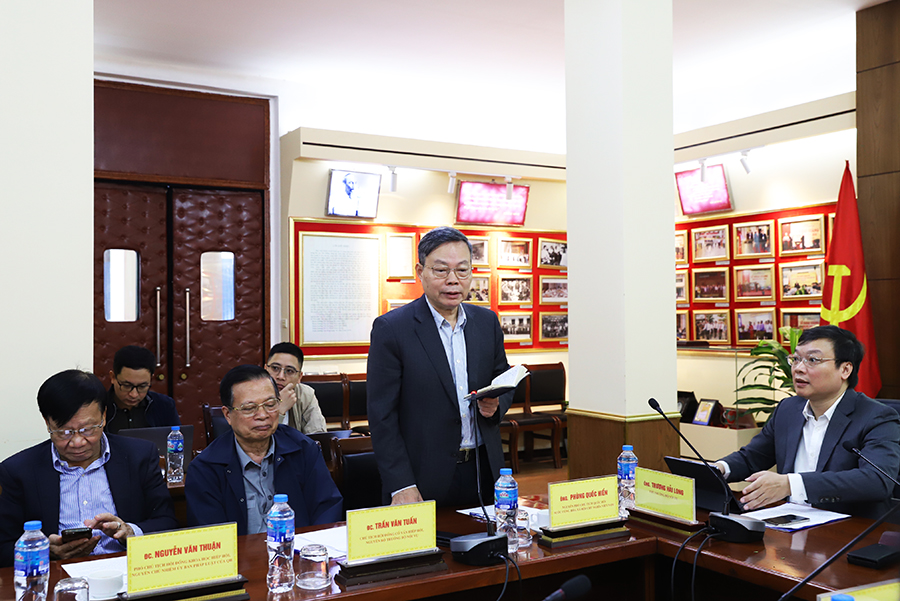
Former Vice Chairman of the National Assembly Phung Quoc Hien speaks at the workshop.
During the workshop, former Vice Chairman of the National Assembly Phùng Quốc Hiển emphasized that decentralization and transfer of power are critical and correct policies of the Party and State. However, it is crucial to fully understand and properly implement them. Research is also needed to eliminate intermediate levels to match the country’s socio-economic development. Additionally, decentralization and transfer of power must always be tied to responsibility and power control from above, across, below, and through self-monitoring.
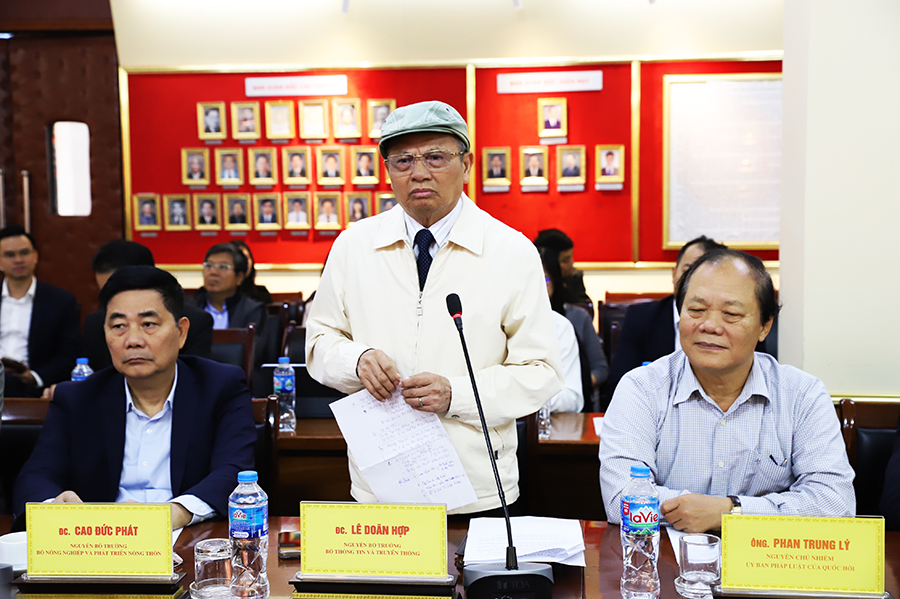
Former Minister of Information and Communications Lê Doãn Hợp suggested that transfer of power should reduce routine tasks for higher levels, including the Government, while increasing the authority of lower levels to expedite work progress. He emphasized the “three clarities”: “clarity of tasks, clarity of personnel, and clarity of responsibility.”
When decentralizing and delegating, five principles must be respected:
- The level receiving sufficient information should be prioritized to make decisions.
- The level directly responsible should make decisions.
- The level most familiar with and closest to the personnel should make decisions.
- Transfer of power depends on the ethics, competence, and credibility of the personnel. Transfer of power without selecting qualified personnel is dangerous, as granting authority to unqualified individuals is risky.
- When decentralizing, three key factors must be addressed: finances, staffing, and personnel.
Former Minister of Home Affairs Trần Văn Tuấn argued that decentralization and transfer of power must be based on national governance principles. It is essential to clearly delineate what roles the State, the market, and society should play. Specifically, what tasks the State should undertake, what the market should handle, and what society should be responsible for. Tasks that require socialization should be delegated to society by the State. Once the State’s roles are identified, it becomes possible to define the responsibilities of the central and local governments. The State should focus on tasks that neither the market nor society can perform.
According to Nguyen Van Thang, former Secretary of the Tây Hồ District Party Committee in Hanoi, the decentralization and transfer of power measures implemented by the Government in recent years need to be reviewed. This is necessary to evaluate whether localities have performed effectively, identify areas where performance is lacking, and determine the underlying causes to address them. Additionally, new areas requiring decentralization and transfer of power should be developed based on assessments of local capacities to ensure appropriateness.
Mr. Thắng also emphasized the importance of building a capable cadre when implementing decentralization and transfer of power. It is crucial to clearly define territorial responsibilities, effectiveness, personnel, and tasks. Oversight and monitoring are needed to ensure compliance with legal regulations. For unresolved issues, research should be conducted to amend related legislation, particularly key laws such as the Law on Government Organization, the Law on Local Government Organization, and the Law on Cadres and Civil Servants.
Furthermore, experts and scientists discussed numerous topics related to decentralization and transfer of power at the workshop. These included concepts, principles, and the importance of decentralization and transfer of power in the current context; defining criteria and mechanisms for decentralization and transfer of power; ensuring management consistency and unity while adhering to Party regulations; protecting the rights and interests of the State and the people; and addressing horizontal, vertical, and intra-agency decentralization. The discussions also highlighted the need to link decentralization and transfer of power with financial and human resource policies.
Experts and scientists agreed with the proposal for the Ministry of Home Affairs to study the integration of decentralization and transfer of power regulations into upcoming amendments to key laws, including the Law on Government Organization, the Law on Local Government Organization, the Law on Cadres and Civil Servants, and related legislation.
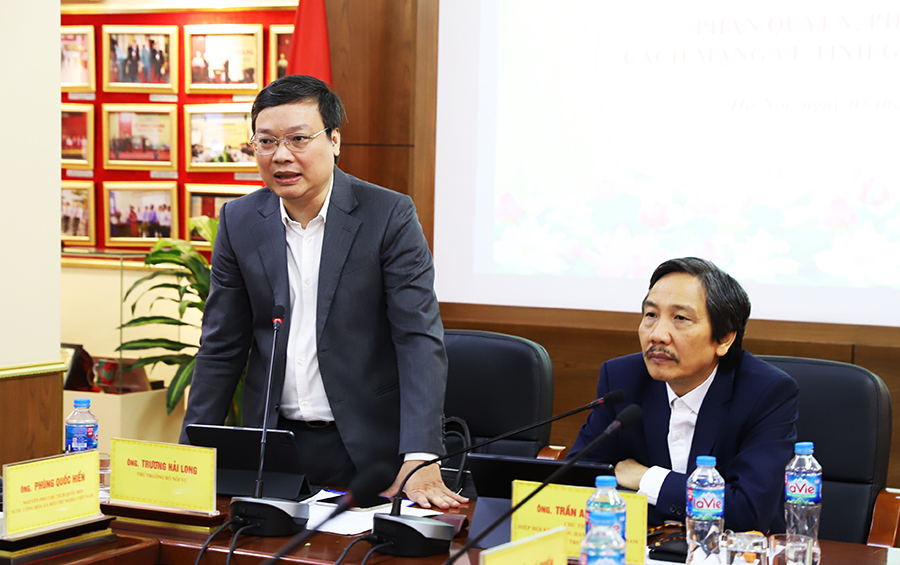
Vice Minister Truong Hai Long’s concluding remarks at the workshop.
In his concluding remarks, Vice Minister Truong Hai Long expressed gratitude and appreciation for the constructive, responsible, and heartfelt contributions of leaders, experts, scientists, and managers to the scientific workshop “Decentralization and Transfer of power in the Revolution of Streamlining Organizational Structures.” Their input contributed significantly to achieving the workshop’s objectives and agenda.
He noted that the discussions provided valuable insights and solutions to many theoretical and practical issues surrounding decentralization and transfer of power between central and local governments in Vietnam.
This serves as an important foundation for the Ministry of Home Affairs, in its role as a policymaking advisory body, to review and propose revisions to laws and regulations, ensuring they are precise, appropriate, and aligned with current realities.
